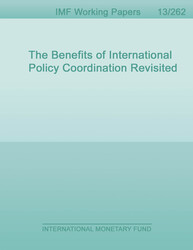
The Benefits of International Policy Coordination Revisited
WP/13/262
This paper uses two of the IMF's DSGE models to simulate the benefits of international fiscal and macroprudential policy coordination. The key argument is that these two policies are similar in that, unlike monetary policy, they have long-run effects on the level of GDP that need to be traded off with short-run effects on the volatility of GDP. Furthermore, the short-run effects are potentially much larger than those of conventional monetary policy, especially in the presence of nonlinearities such as the zero interest rate floor, minimum capital adequacy regulations, and lending risk that depends in a convex fashion on loan-to-value ratios. As a consequence we find that coordinated fiscal and/or macroprudential policy measures can have much larger stimulus and spillover effects than what has traditionally been found in the literature on conventional monetary policy.
Publication date: December 2013
ISBN: 9781484326626
$18.00
Add to Cart by clicking price of the language and format you'd like to purchase
Available Languages and Formats
| English |
Prices in red indicate formats that are not yet available but are forthcoming.
Topics covered in this book
This title contains information about the following subjects.
Click on a subject if you would like to see other titles with the same subjects.
Monetary Policy , Fiscal Policy , Macroprudential Policy , International Policy Coordination , International Spillovers , Nonlinearities , Fiscal Multipliers , Macrofinancial Linkages , Prudential Regulation
Summary
Copyright © 2010 - 2024
Powered by:
AIDC



